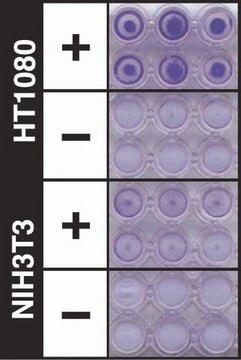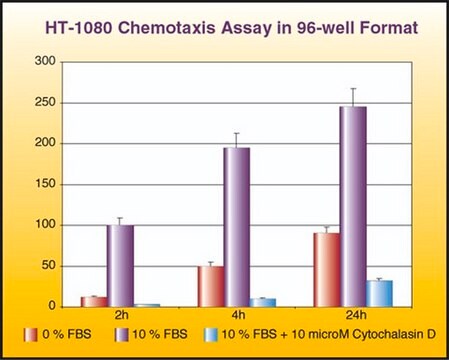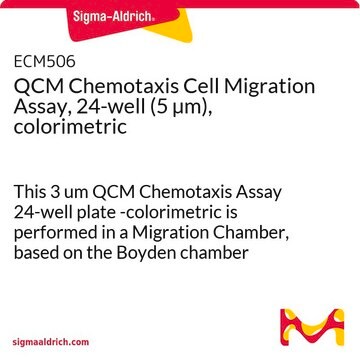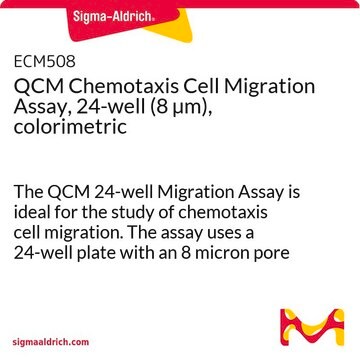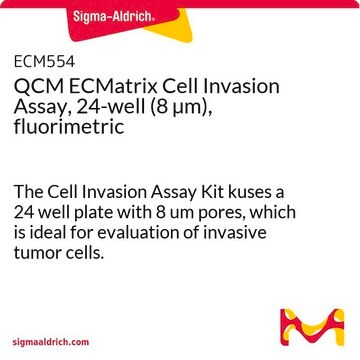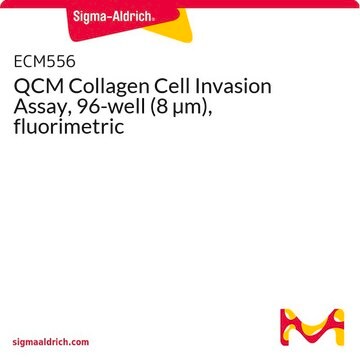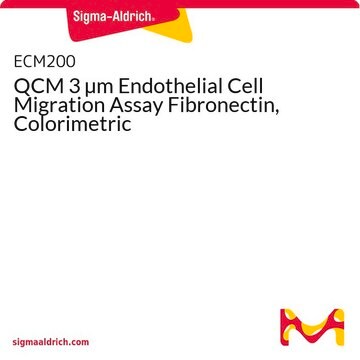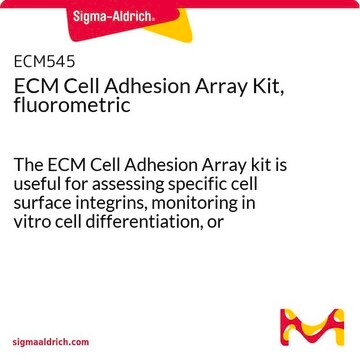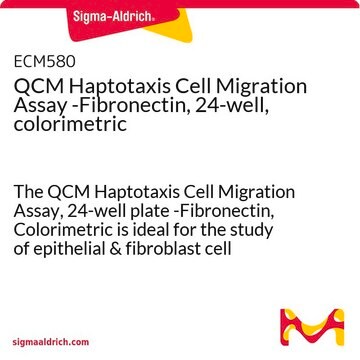ECM555
QCM ECMatrix Cell Invasion Assay, 96-well (8 µm), fluorimetric
The CHEMICON Cell Invasion Assay Kit employs a 96-well plate, and provides an efficient system for evaluating the invasion of tumor cells through a basement membrane model.
Synonym(s):
8 μm pore cell invasion assay
Sign Into View Organizational & Contract Pricing
All Photos(1)
About This Item
UNSPSC Code:
12352207
eCl@ss:
32161000
NACRES:
NA.32
Recommended Products
Quality Level
species reactivity
human
manufacturer/tradename
Chemicon®
QCM
technique(s)
activity assay: suitable
cell based assay: suitable
detection method
fluorometric
shipped in
wet ice
General description
QCM ECMatrix Cell Invasion Assay involves invaded cells at the bottom of the insert membrane and can be obtained by treating the membrane with cell detachment buffer. The cells are lysed and detected by the patented CyQuant GR dye. This dye is a green-fluorescent dye and binds well with cellular nucleic acids to emit a strong fluorescence. This assay kit provides an efficient system for evaluating the invasion of tumor cells through a basement membrane model.
Application
QCM ECMatrix Cell Invasion Assay, 96-well (8 μm), fluorimetric has been used in the cell invasion assay of:
- human cervical carcinoma
- osteosarcoma
- breast cancer cells
- colorectal cancer cells
Features and Benefits
- The assay does not require cell labeling, scraping, washing, or counting
- Suitable for large-scale screening and quantitative comparison of multiple samples due to homogenous fluorescence detection and 96 well insert
- Enables a quick and efficient system for the quantitative determination of several factors for cell invasion
Components
Sterile 96-well Cell Invasion Plate Assembly: (Part No. 90200) One 96-well feeder tray, and one 96-well Cell Invasion Chamber plate with ECMatrixTM -coated inserts.
96-well Cell Culture Tray: (Part No. 90129) One 96-well feeder tray.
Cell Detachment Solution: (Part No. 90131) One bottle - 16 mL.
4X Cell Lysis Buffer: (Part No. 90130) One bottle - 16 mL.
CyQuant GR Dye: (Part No. 90132) One vial - 75 μL
96-well Cell Culture Tray: (Part No. 90129) One 96-well feeder tray.
Cell Detachment Solution: (Part No. 90131) One bottle - 16 mL.
4X Cell Lysis Buffer: (Part No. 90130) One bottle - 16 mL.
CyQuant GR Dye: (Part No. 90132) One vial - 75 μL
Legal Information
CHEMICON is a registered trademark of Merck KGaA, Darmstadt, Germany
signalword
Danger
hcodes
Hazard Classifications
Aquatic Acute 1 - Aquatic Chronic 2 - Eye Dam. 1
Storage Class
10 - Combustible liquids
Certificates of Analysis (COA)
Search for Certificates of Analysis (COA) by entering the products Lot/Batch Number. Lot and Batch Numbers can be found on a product’s label following the words ‘Lot’ or ‘Batch’.
Already Own This Product?
Find documentation for the products that you have recently purchased in the Document Library.
Customers Also Viewed
Sodium arsenite inhibits migration of extravillous trophoblast cells in vitro.
Chi-Shan Li,Rita Loch-Caruso
Reproductive Toxicology null
Sheeba Irshad et al.
Cancer research, 77(5), 1083-1096 (2017-01-14)
Cancer cells tend to metastasize first to tumor-draining lymph nodes, but the mechanisms mediating cancer cell invasion into the lymphatic vasculature remain little understood. Here, we show that in the human breast tumor microenvironment (TME), the presence of increased numbers
Increases in mitochondrial biogenesis impair carcinogenesis at multiple levels.
Xiao Wang,Carlos T Moraes
Molecular Oncology null
Differential expression of matrix metalloproteinases in brain- and bone-seeking clones of metastatic MDA-MB-231 breast cancer cells.
Andreas M Stark,Bartosz Anuszkiewicz,Rolf Mentlein,Toshiyuki Yoneda,H Maximilian Mehdorn et al.
Journal of Neuro-Oncology null
Targeting of Integrin {beta}1 and Kinesin 2{alpha} by MicroRNA 183.
Li G, Luna C, Qiu J, Epstein DL, Gonzalez P
The Journal of Biological Chemistry null
Our team of scientists has experience in all areas of research including Life Science, Material Science, Chemical Synthesis, Chromatography, Analytical and many others.
Contact Technical Service